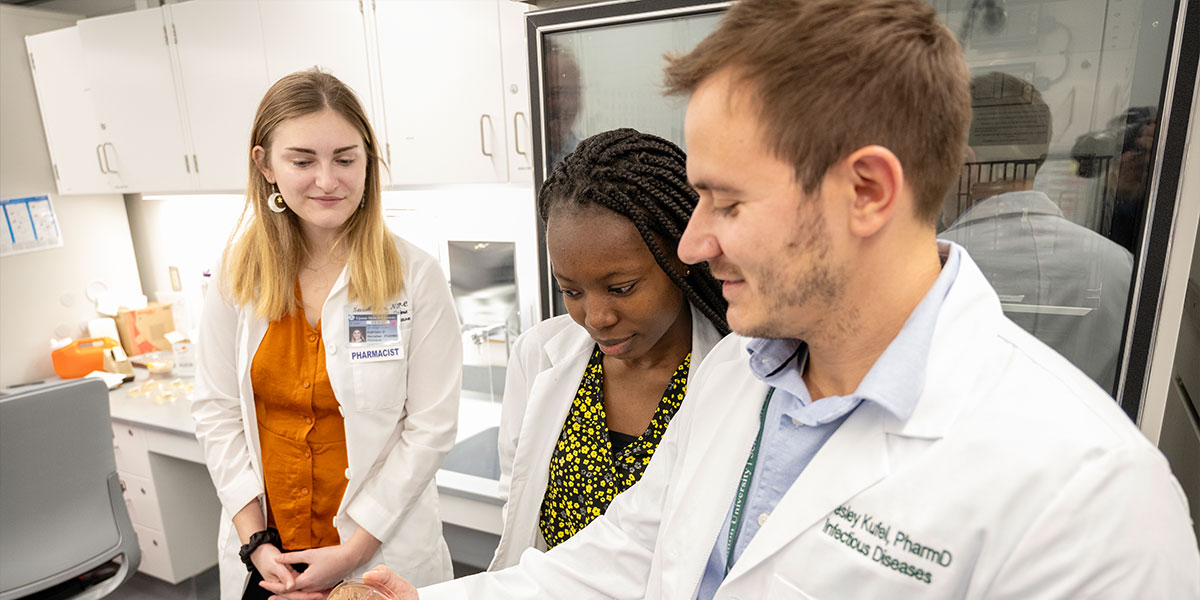Binghamton clinical associate professor Wesley Kufel receives national recognition
“He has a great model for integrating practice and student teaching with research.”

For Wesley Kufel, treating patients with infectious diseases is like solving a puzzle. He examines the relationship between the patient, the pathogen and the drug to find, as he explains it, clues that “help come up with the best potential antimicrobial regimen for that particular patient.”
Kufel, a clinical associate professor in the Department of Pharmacy Practice at the School of Pharmacy and Pharmaceutical Sciences, is driven by a desire to optimize patient care and pursues this goal through clinical pharmacy practice, teaching and research. As a result of his accomplishments, the American College of Clinical Pharmacy (ACCP) selected Kufel as the 2023 recipient of its New Clinical Practitioner Award.
Each year, ACCP recognizes one early-career practitioner for contributions to the health of patients and the practice of clinical pharmacy. Award candidates must have completed their terminal training or degree within the last six years and be nominated by another ACCP member.
Kufel embodies the award’s criteria, says his nominator, Sarah Spinler, professor and co-chair of the Department of Pharmacy Practice: “He has a great model for integrating practice and student teaching with research.”
Kufel came to SOPPS in 2017 as a clinical assistant professor and was promoted to clinical associate professor in 2022. He also holds a faculty appointment as a clinical associate professor of medicine, division of infectious diseases at SUNY Upstate Medical University. There, he provides infectious disease education to students, residents and fellows, and practices as a clinical pharmacy specialist in infectious disease, with the infectious diseases consult team.
After earning his Doctor of Pharmacy degree from the University at Buffalo in 2015, Kufel completed his PGY-1 residency at SUNY Upstate University Hospital and his PGY-2 residency, specializing in infectious diseases, at the University of North Carolina Medical Center. He is a board-certified pharmacotherapy specialist (BCPS), board-certified infectious diseases pharmacist (BCIDP) and an HIV certified pharmacist (AAHIVP) by the American Academy of HIV Medicine.
“I always wanted to have more involvement in treatment decisions and be involved in direct patient care responsibilities,” Kufel says. “That really drove me to go through residency training and the additional education to become a clinical infectious disease pharmacist.”
LEADING THE CHARGE
As a clinical pharmacist at Upstate University Hospital, Kufel has implemented a new practice model. He is the first pharmacist to practice in the hospital’s infectious disease consult service, where he collaborates with physicians on antimicrobial treatment decisions and management.
He also serves as a preceptor for pharmacy students on their advanced pharmacy practice experiences, as well as PGY-2 infectious diseases and PGY-1 pharmacy residents.
“I precept them on their infectious diseases rotation so that they can be involved in the direct patient care and learn more about what an infectious disease pharmacist does, but also have a lot of input in the patient care decision making,” he says.
GROWING PILE OF ACCOMPLISHMENTS
Among his contributions at Upstate University Hospital, Kufel has helped develop several pharmacist-led services, including a Staphylococcus aureus bacteremia bundle, empiric antibiotic order sets, an antimicrobial stewardship discharge antibiotic prescription review program and penicillin allergy management initiative.
He played a major role in the hospital receiving designation in 2019 as an Antimicrobial Stewardship Center of Excellence from the Infectious Diseases Society of America. And he co-founded the Pharmacy Clinical Research Microcredential at the hospital in 2018 to help pharmacy residents develop the skills needed to engage in research.
